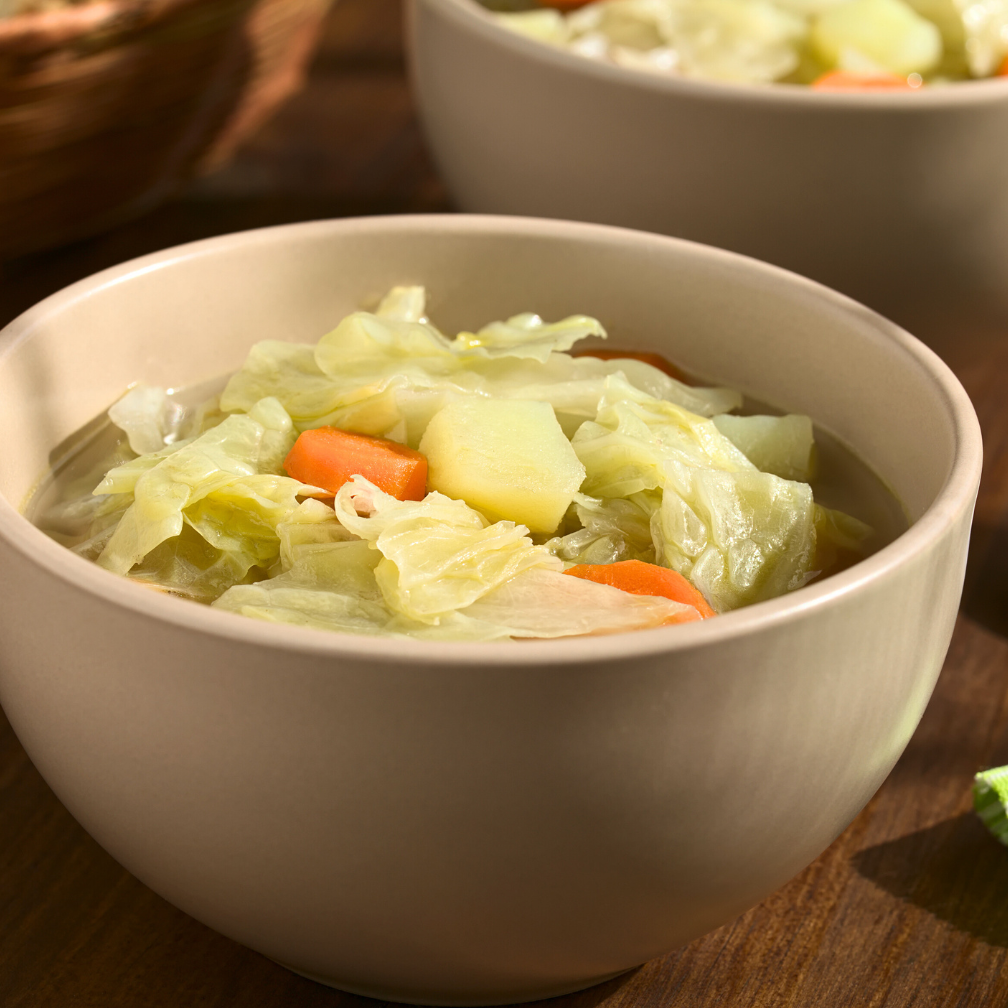In the last few years, TikTokers have been touting the benefits of a “cabbage soup detox” or the “cabbage soup challenge.” In videos with hundreds of thousands of views, social media users claim that eating only cabbage soup for days or weeks on end has helped them lose significant amounts of weight in a short amount of time. But this approach to weight loss is far from new.
In fact, the cabbage soup diet has likely been around since the 1950s, according to Smithsonian. It might be effective in the short term—but is it actually healthy? Spoiler alert: no, it’s probably not. We spoke to Sapna Peruvemba, MS, RDN, a vegan registered dietitian and founder of Health by Sapna, to find out more.
Can you actually lose weight on the cabbage soup diet?
The clue is in the name, but the cabbage soup diet involves eating a heck of a lot of cabbage soup (often with a few other vegetables in the mix, like carrots or onions) and not much else. Because of its restrictive nature, people usually follow the diet for only a few days or weeks at the most. During that time, they will often lose several pounds in weight. “Essentially, by eating only low-calorie veggies, you’re cutting calories to roughly 1,000 a day,” explains Peruvemba. “The weight comes off quickly—but only temporarily.”
According to the Centers for Disease Control and Prevention (CDC), if you’re looking to lose weight, you should aim to do so at a slow and steady pace. It notes that this is usually around one to two pounds a week for most people.
 Canva
Canva
When you only eat cabbage soup, what you’re actually losing quickly is water and muscle, explains Peruvemba, not fat. “Without enough carbohydrates, your body taps into stored carbs (glycogen), which release water as they’re used up,” she notes. “That ‘quick fix’ weight loss can seem promising on the scale, but it doesn’t translate to lasting changes.”
This is the same for most restrictive diets. In fact, research shows that of the roughly 45 million Americans who go on some form of diet each year, most will gain the weight back. This is ultimately because eating only one meal, or very little food, for days or weeks on end is not sustainable for most people. On top of this, it also promotes a lasting unhealthy relationship with food, says Peruvemba.
“When people start to view food as something to control or avoid, rather than something to nourish and enjoy, it can lead to cycles of guilt, overindulgence, or even binge-eating,” she explains. “A diet that eliminates entire food groups can make it harder to enjoy food in moderation later on, which is key for long-term healthy eating.”
“Despite its extreme restrictions, the cabbage soup diet has staying power for a simple reason: it’s a quick fix in a world that wants instant results. Many people would rather try something fast and see the pounds drop immediately, even if it’s not sustainable, than adopt the gradual changes that are known to work in the long run.”
Is eating one kind of food healthy?
As a meal choice, cabbage soup is not unhealthy. In fact, it’s actually pretty nutritious. Cabbage is a source of fiber, vitamin C, vitamin K, and folate, for example. “With only 10 percent of Americans meeting the vegetable intake recommended by the CDC, it’s certainly a step in the right direction,” says Peruvemba.
But a nutritious diet doesn’t just include one kind of food, and any diet that promotes this is not healthy. “The key to a healthy diet is variety, as each food group offers a unique blend of nutrients essential for our health,” she adds. Eating nothing but cabbage soup for days on end means you’re missing out on nutrients like B vitamins, healthy fats, protein, and calcium. The result of that, according to Peruvemba, could be feelings of tiredness and lightheadedness, and even malnutrition.
 Getty
Getty
Instead, the dietitian notes you should eat cabbage soup, sure, but combine it with other meals you love, too. And if you want to lose weight, you should aim to stay in a very small calorie deficit over a long period of time. Other lifestyle changes like exercising regularly, getting plenty of sleep, and staying hydrated are also important for healthy weight loss.
“If you’re looking for results that last without feeling deprived, a balanced, plant-based diet is a powerful option,” says Peruvemba. “Unlike animal products, many plant foods are naturally lower in calories yet high in nutrients, making it easier to create a moderate calorie deficit without feeling restricted.”
She added: “Gradual shifts can yield long-term benefits, unlike the quick-but-fleeting weight loss of diets like the cabbage soup plan. In the end, lasting change is more about the journey than a quick fix.”

